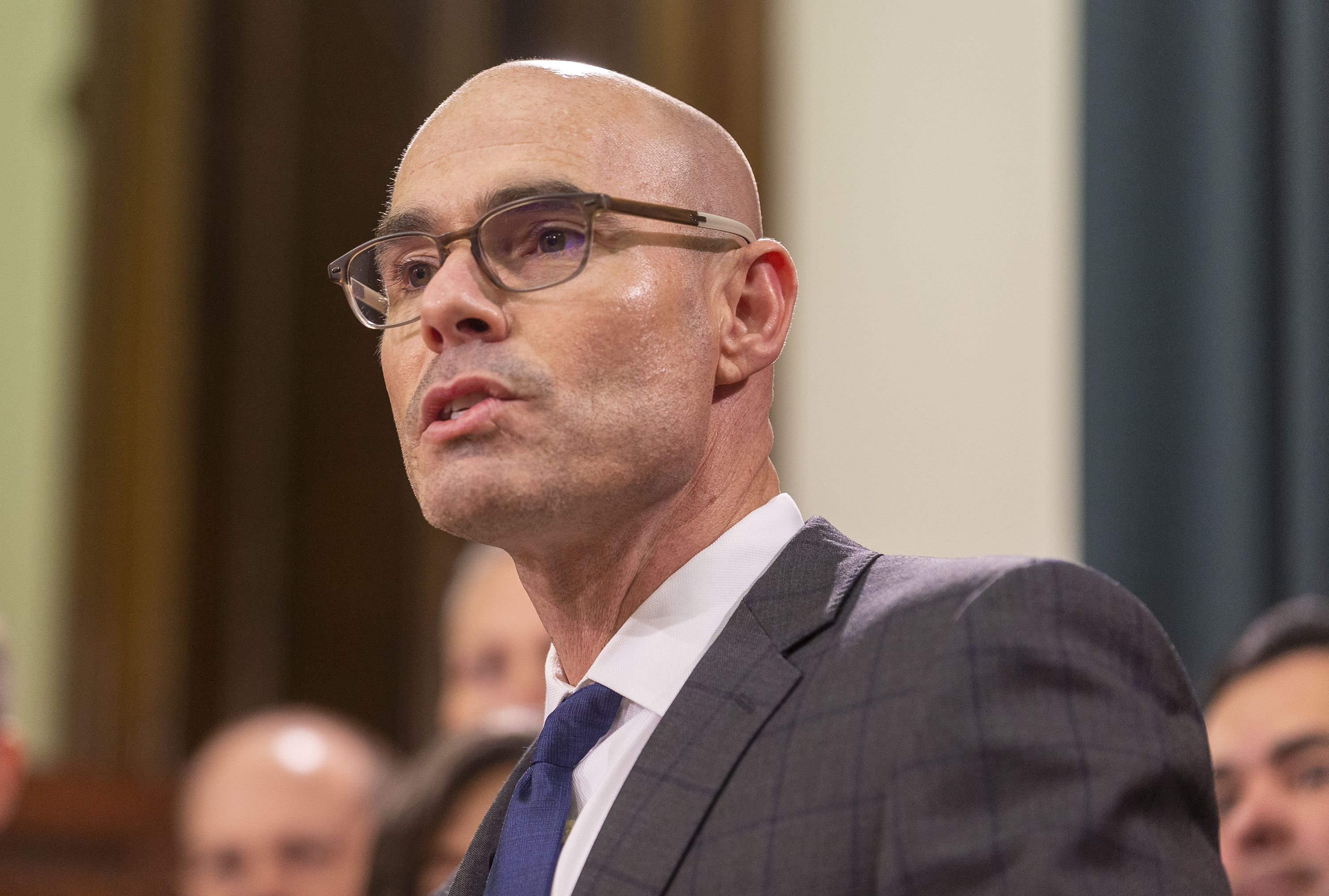Will lawmakers heed message from voters?
New subhead
Jose Medina, left, and Cesar Rodriguez paint a senator's office at the Capitol last month. State Preservation Board employees and contractors are busy setting up offices and sprucing up the Capitol in preparation for the start of the legislative session that begins Tuesday. (JAY JANNER/AMERICAN-STATESMAN)
For the 86th time since statehood, the best and brightest and some others from around Texas will convene this week in downtown Austin to begin the biennial 140-day festival of making laws for the people and money for the lobbyists.
Relax. We’ve been through this before. Many of us will survive just fine.
Last time these folks did this they spent a lot of time yakking about things like who should attend which bathroom. This happened while many (including me) espoused a theory that deeply red Texas, typified by Republican Lt. Gov. Dan Patrick, was churning ever rightward toward an extreme that eventually would be deemed wrong.
We had an election this past November that can be interpreted as Texans offering evidence that that's just what happened. Oh, the Repubs still control everything in and around the Texas Capitol, but not as firmly so. Gov. Greg Abbott won re-election by 13.3 points, down from his 20.4-point win four years earlier.
And perhaps more instructively, while Repubs won re-election to all other statewide offices, the margins were down. For the first time in many election cycles, some of the races teetered eye-openingly close to being winnable by a Dem, topped by Beto O’Rourke coming within 2.6 points of ousting GOP U.S. Sen. Ted Cruz.
Elsewhere in statewide races, little-known and underfunded Dems gave incumbent Repubs a scare. Justin Nelson finished within 3.6 points of incumbent (and long-indicted) GOP Attorney General Ken Paxton. Mike Collier came within 4.8 points of Patrick. And Kim Olson fell to incumbent GOP Ag Commissioner Sid Miller by 4.9 points.
Four years earlier, Paxton had won by 20.8 points, Patrick by 19.4 points and Miller by 21.8 points.
Whether those numbers should be read as an overall litmus test about the state of state politics or a mere and temporary symptom of Betomania remains to be seen. But some Repubs see something maybe worthy of note as the making of laws begins.
“Maybe, just maybe,” state Sen. Kel Seliger, R-Amarillo, said at a Texas Tribune pre-session event, “there will be an added emphasis on bipartisanship and cooperation and realizing that we’ve got to get to May together with some real challenges that don’t really look like Republican challenges or Democratic challenges when we talk about school finance and things like that.”
You betcha, says Sen. Kirk Watson, D-Austin, who echoed Seliger’s sentiments at the forum by noting the election results left him “pretty hopeful” of a “less partisan mood and more of a problem-solving mood on the big issues we need to pay attention to between now and the end of the session.”
Seliger, who’s teed up to be something of a periodic GOP dissident, seems to buy into the theory about his party reaching or nearing a dangerous extreme.
“There are Republicans leaving Republicans just as Democrats left Democrats in the late ‘80s and early ‘90s,” he said. “It’s a simple schism. And as Republicans we have got to stop that. We went from being dominant to simply being majority … and we need to be very, very careful going forward I think.”
The numbers still give the GOP a decided edge in both of the Capitol’s chambers, though not as decided as two years ago. The House has gone from 95-55 last session to 83-65, with special elections upcoming to fill vacancies in two Democratic districts. On the Senate side, it was 20-11 last time and will be 19-12 this time.
Rep. Shawn Thierry, D-Houston, reading the numbers and the election results, said she’ll come to the chamber optimistic “we will not get caught up in the culture wars.”
Up in Tarrant County, long labelled as the most conservative urban county in the state, Rep. Matt Krause, R-Fort Worth, won re-election in November by 8 points over the same Democrat he had defeated by 22 points in 2016.
“Even some of the most conservative people are saying, ‘Hey, it was a good wake-up call.’ We’re going to have to fight for our principles but maybe do it in a different tone,’” Krause said at the Tribune event.

Consensus on Job One
The good news going into the 86th is that there’s spoken consensus at the top about Job One. Abbott, Patrick and Speaker-to-be Dennis Bonnen say it’s the outdated, indefensible, inequitable way in which we pay for public education.
This is an issue that comes up from time to time and can’t be too hard to solve. Seems like the Legislature solves it every few years, generally after some court rules the previous solution unconstitutional. So, here we go again, against the backdrop of a 2016 Texas Supreme Court ruling that found the current system constitutional but "undeniably imperfect, with immense room for improvement” and in need of “transformational, top-to-bottom reforms that amount to more than Band-Aid.”
The 2017 Legislature took some stabs at an overhaul and wound up calling for a commission to study the problem.
Now, finding consensus on how to re-rework public education funding will be tricky and invites battles on knotty included topics such as a property tax overhaul and using public money to pay for private school tuition. Consensus could prove confounding. Heck, I’ve yet to sense agreement on how to talk about the problem. Some lawmakers talk about “school f’nance.” Others call it “school FEYE-nance.” Y’all need to get together on that.
Though there’ll be plenty on the legislative to-do list, there is, as always, only one thing that has to be done: write a two-year state budget. And that means money. And kind of like around your Texas house, there’s never enough for the Texas House and Senate. There will be a general push to do something to set meaningful limits on property tax growth, but, as usual, there’s little to no taste for new tax sources.
All this against the backdrop of depressed oil prices that are good news for you at the gas pump but bad news for lawmakers writing a budget in an energy-dependent state. There’s also a hurricane to pay for and other immediate needs coming due. Billions of dollars of this will be handled in a “supplemental” appropriation to be hatched prior to writing the 2020-21 state budget.
If history is instructive, some of this will be covered by what’s known in polite company as “accounting techniques.” Do not try this at home.
When it’s over (and never discount the possibility of a special session after the 140 regular days), we’ll look back on the 86th and reminisce about the fights we saw coming and the ones we didn’t. Most importantly, we’ll know if the Repubs in charge took note of the November elections and backed away from culture wars.

Which shade of red?
During the Tribune’s pre-legislative session, Krause and Rep. Rafael Anchia, D-Dallas, got into a predictably party-line disagreement on gun regulation. It got a bit heated, so much so that Anchia quickly followed up with a tweet that included a photo of the two of them with a heart Anchia drew around them.
“I want everyone who watched the Texas Tribune panel today to know that I have mad love for @RepMattKrause despite policy differences,” Anchia wrote. “That’s what makes #TXlege so great!”
“The feeling is mutual Mr. Chairman! :),” Krause tweeted back.
Nice. We'll see how long the love lasts.
In a pre-session interview, Abbott proclaimed to my colleague Jonathan Tilove that “Texas remains a red state.”
True enough, but even color-challenged Texans like myself know that red comes in many shades. We'll see which one dominates this year under the pink granite dome.
